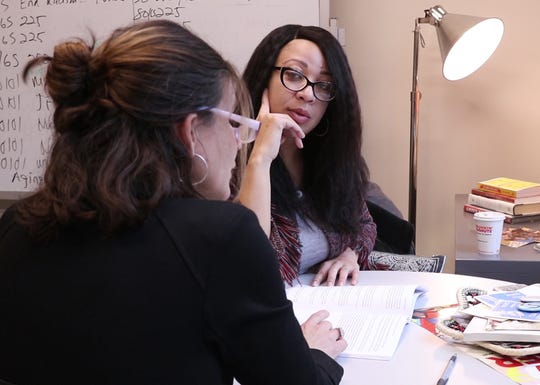
Nafeesah Goldsmith
Nafeesah Goldsmith is a community organizer with the nonprofit organization Jersey City Together. She graduated Rutgers University with a bachelor’s degree and is working towards a Master’s in Criminal Justice at Monmouth University. She has been working to curtail the practice of solitary confinement in New Jersey, as she has had first hand experience of its abuse. For nearly 13 years, Nafeesah Goldsmith was incarcerated for at the Edna Mahan Correctional Facility and was forced to spend nearly 60 days in solitary confinement—in the New Jersey State Prison in Trenton, a male inmate facility since Edna Mahan did not have its own isolation ward (now, it does).
There Goldsmith spent two months of isolation, “with the exception of 45 minutes of recreation time, most days, in the prison yard. She said she sometimes went without showering, depending on the mood of the guards. To pass the time she spoke with isolated prisoners through the vents and the toilet, sometimes playing a makeshift version of hangman.”
For inmates in segregation, the most traumatizing aspect is the dehumanizing treatment they face while in solitary confinement. Goldsmith is still reminded of the anguished cries from the other solitary cells: “You hear nothing but screams and it’s loud and there’s banging. You have people having mental episodes and people having medical emergencies. You have people with seizures and you have people attempting suicide.” That is only some of the horror that people suffer in solitary, or as New Jersey calls it, administrative segregation.
Seizing on the nomenclature of the term for solitary confinement, in 2016 former Governor Chris Christie vetoed a bill to restrict the practice to 15 or 20 consecutive days over a two-month period. The bill would have also sought to exempt mentally ill or pregnant inmates and require daily medical evaluations for those in isolation. His excuse? The piece of legislation, “seeks to resolve a problem that does not exist in New Jersey.”
But the problem very much does exist in the Garden State. Of the roughly 80,000 inmates in the United States currently in isolation, New Jersey holds 1,500. New Jersey ranks fourth in the country in the amount of time it places people in isolation. As far back as 2011 the United Nations claimed such punishment amounts to torture or cruel, inhuman and degrading treatment.
Today, however, there is a turn of opinion in the Garden State, and another bill is back on the table. A-314/S-3261 would have similar exemptions as the bill Christie vetoed, and expand it to include people over 21 and young and 65 and older, and people with developmental disabilities and serious mental conditions. Survivors are telling their stories and forcing others who would not have interacted with the criminal justice system to examine the uses and abuses of solitary confinement. It is forcing the citizens of New Jersey to recognize that we are not treating other people with respect and dignity the moment that they are labeled “prisoner.”
Nafeesah Goldsmith’s bravery and willingness to come forward with her story, along with those of others, is helping to make significant and positive changes in New Jersey as regards our treatment of incarcerated human beings. She is willing to tell her story at schools, at coalition events, and to anyone who will listen. It’s time we started to listen.
(Photo Credit: Asbury Park Press / Doug Ford)